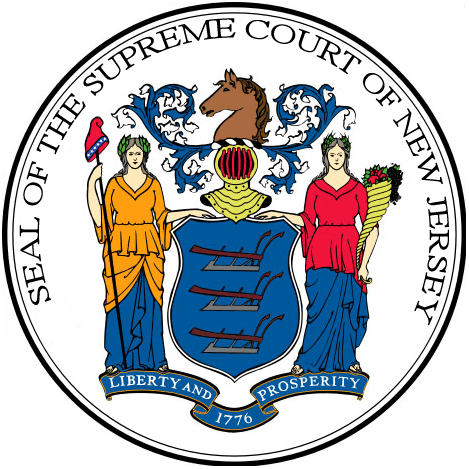Image of the Seal of the Supreme Court of New Jersey, via Wikipedia.
After a seven-year legal standoff, the New Jersey Supreme Court ruled unanimously on Monday, that a grand jury investigation into clergy sexual abuse in the Catholic Church may proceed, New Jersey Today reported.
The investigation specifically targets the Diocese of Camden and marks a critical legal and moral turning point for hundreds of survivors across the state, many of whom have waited decades for institutional accountability.
At issue was whether the state had legal authority to investigate the Diocese of Camden, which encompasses 62 parishes across South Jersey. The Diocese argued the probe was unconstitutional and invasive, claiming it would unfairly damage the reputations of clergy members—living and deceased—without affording them due process. The state’s highest court rejected those arguments in full.
Writing for the Court, Chief Justice Stuart Rabner stated that courts cannot block investigations based on hypotheticals. “No grand jury has issued a report. It is not premature for the state to continue its inquiry,” Rabner wrote, emphasizing the need for transparency over institutional protection.
The ruling allows a special grand jury to not only review cases of clergy sexual abuse, but also to investigate whether church officials covered up these crimes. It echoes similar grand jury investigations in Pennsylvania and Illinois that revealed sweeping abuse and concealment within the Catholic hierarchy.
A Landmark Moment for Survivors
For survivors and advocates, the ruling is a long-overdue step toward justice.
“Decades of crimes against children will finally be exposed,” said Mark Crawford, New Jersey director of SNAP (Survivors Network of those Abused by Priests). “This investigation is about truth—and the church has worked too hard for too long to suppress it.”
New Jersey Attorney General Matthew Platkin launched the investigation in 2018, shortly after the release of the Pennsylvania grand jury report detailing abuse by over 300 Catholic priests. That landmark report inspired a wave of similar probes across the U.S.
Despite pushback from the Camden Diocese, Platkin’s office remained firm. “Our duty is to the people of New Jersey—especially those who were harmed while institutions looked the other way,” Platkin said in a statement following the ruling.
Political and Legal Support
State Senator Joe Vitale, a longtime advocate for survivors, praised the Supreme Court’s decision. “This is a significant victory,” he said. “It reinforces what we’ve said all along—no institution is above the law.”
Vitale, who authored several bills expanding the rights of abuse survivors in New Jersey, said the grand jury’s work could not only expose abuse but also offer a path to healing.
“This is a moral obligation,” Vitale said. “We must reckon with what was done in the dark.”
Camden Diocese and Ongoing Resistance
In 2022, the Diocese of Camden agreed to an $87.5 million settlement with approximately 300 abuse survivors. It was one of the largest Catholic abuse settlements in state history. However, survivors and advocates argued that money alone was not enough—the truth must also come out.
The Diocese has fought for years to prevent the release of internal records related to alleged abuse and how complaints were handled. Now, with the Supreme Court’s ruling, that resistance may no longer be sustainable.
The grand jury will begin reviewing sealed documents and hearing testimony to determine how widespread the abuse was, who knew about it, and who may have enabled or concealed it.
A Broader Reckoning in the Church
New Jersey joins several other states where investigations have pierced the veil of institutional secrecy within the Catholic Church. From the sweeping 2018 Pennsylvania report to Illinois’ recent 700-page exposé naming 451 abusers, a national reckoning continues to unfold.
Despite major settlements and public apologies, church officials have consistently fought legal probes, often citing religious freedom or constitutional protections. The New Jersey Supreme Court ruling sends a clear message that civil accountability cannot be evaded by religious institutions.
The Road Ahead
The grand jury process will likely be lengthy and largely confidential, but the implications could be wide-reaching. Survivors who were previously denied justice due to expired statutes of limitation may now see their experiences validatedan, d the people and institutions that failed them held to account.
For many, this investigation represents something deeper than legal closure.
“This isn’t just about the past,” said Crawford. “It’s about protecting future generations. It’s about making sure this never happens again.”
Survivors of Catholic clergy sexual abuse can learn more about their legal rights and options by visiting our Catholic Church Sexual Abuse Lawsuit Guide.




